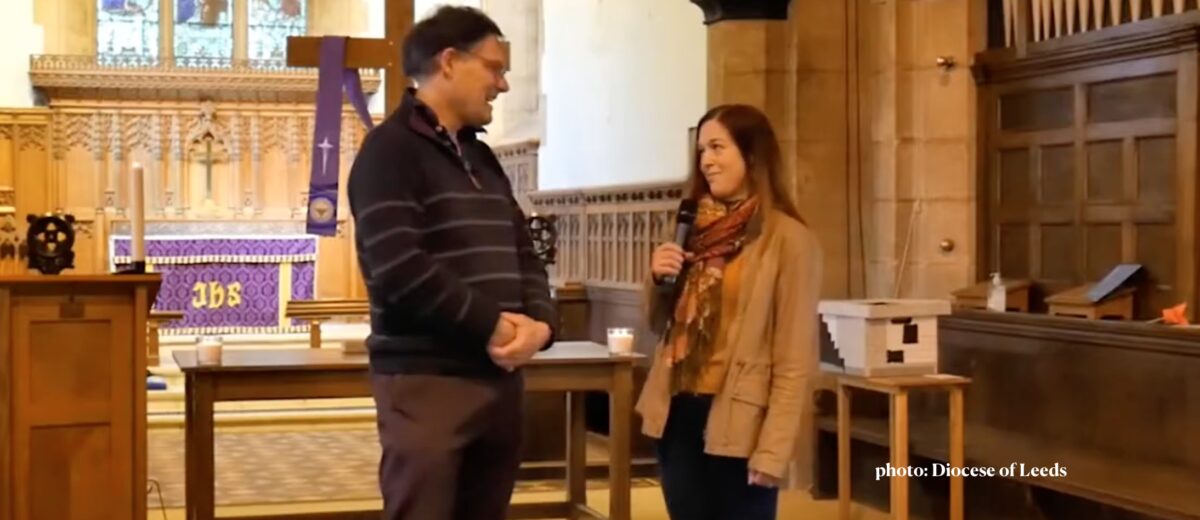A simple transferable idea is transforming the understanding of the gospel, church and witness in many churches across Britain.
But as far as I know it hasn’t yet made the leap across the Channel (I’d be glad to hear I’m wrong).
It’s called This Time Tomorrow, or simply, TTT.
Briefly, it involves a short slot in the normal worship service where someone from the congregation is interviewed by the pastor – or anybody really – and asked three basic questions:
Q1. Where will you be this time tomorrow?
Let’s say it is 10.45 Sunday morning. The ‘worship’ has ended; the sermon has yet to begin. So where do most people find themselves at 10.45 on Monday morning? In the office. In front of the classroom. In the factory. Studying in the library. In a meeting. Driving a bus. Changing diapers. Vacuuming bedrooms. Teaching nursery rhymes to pre-schoolers. Serving in a clothing shop. Preparing the operating theatre for the next surgery. Pouring a customer a frothy cup of cappuccino. Collecting the neighbourhood trash… The possibilities are endless.
But when else do we discover the colourful variety of jobs, professions, callings, occupations and activities our fellow church attendees represent if we sit in rows of pews or chairs looking at the back of the head of the person in front of us?
By regularly giving opportunity to discover the kaleidoscope of social and civic engagements represented in any given church congregation, we become aware of the broader nature of the church, God’s people, called to flesh out the good news in our daily lives, Monday to Saturday. This is the church scattered, the church beyond the congregation, now on a Sunday morning gathered momentarily for the purpose of being equipped.
Equipped for what? For the work of the Kingdom, out there in the world, each day in all circumstances. Paul tell us in Ephesians 4:11&12 that the core task of the church leaders – the apostles, the prophets, the evangelists, the pastors and teachers – is to equip the rest of us for the real work of the church, not just for us to listen to sermons.
Q2. What challenges and opportunities do you face in your work?
As the interviewer poses this second question, the rest of us are probably asking ourselves what answer we would give. We begin to ask, in what way is my work related to fulfilling the Greatest Commandment to love God and neighbour as ourselves? and the Great Commission to make God known to everyone everywhere? Even before we hear the answer, we are stimulated to reflect on being Kingdom agents in our daily lives.
The short TTT interlude in the church service stimulates us to realise that our job is not simply to put bread on the table but often will create contacts with others who may have no other Christian contact.
All of us find it challenging to live in a culture dominated by the rejection of God and the Bible as his revealed will. We need the support of the congregation to stand faithfully and courageously in the workplace, the marketplace and the classroom against all the pressure to ‘go with the flow’, to make ethical compromises, to engage in ‘creative’ bookkeeping, or to succumb to the culture of flirtation with colleagues…
Opportunities? ‘Now that you mention it…’ We begin to realise that each day presents opportunities to ‘respond in the opposite spirit’. Over time others begin to notice this and wonder what it is that is different about us. Or perhaps you can influence the writing of a classroom curriculum in which the dignity of each child is upheld. Or charge a fair price for a well-executed carpentry job… Small faithful steps of obedience in line with the grain of the universe.
Q3. How can we pray for you?
What an encouragement for each of us to realise that the whole church is standing with us in prayer for our daily lives! And that God has called each of us to play a part in the Great Commission wherever we find ourselves; that we are part of the church’s outreach in the community and city!
I recently attended a service where a young woman was being prayed into the task of church treasurer. Yet her daily job in the financial sector involved far greater responsibilities than her new church role. Why didn’t we bother to pray for her daily role? I wondered.
This TTT concept has been pioneered in Anglican circles in Britain (see this video for example) but could be implemented in any church environment. Another variation is to break into small groups and each person takes turns to answer the three questions, finishing with a time of prayer for each other.
TTT can expand our understanding both of the church and of our personal calling as Kingdom agents in our daily life.

Till next week,




Hello Jeff.
Thank you for the article, learning something new every time.
May I ask you one question, though? I have never came across the term “the grain of the universe”. And googling it did not help a whole lot. Can you please help me understand this prase, as it seams important?
Thank you.
Hello Olga,
I don’t see an answer to your question, so I offer my idea on “the grain of the universe”.
(Forgive me if someone else has chipped in as I can only see Olga’s reply.)
Jeff is reflecting on a carpenter, and the comment is in the context of them working with wood.
Wood grows in a certain direction (upwards, obviously!).
When it is cut, you can see the lines of the way it has grown.
When you cut in this direction, you are cutting “with the grain”, the natural way to cut it with least resistance. If one cuts across the grain, sideways on to the direction of its natural growth, then you will need more strength to do that as you are not going with the grain.
“The grain of the universe” implies that God has set things in a particular order, and when we join in with His kingdom’s way of being, we are actually flowing with the way He ordered it from the beginning, as opposed to the fallen way, which has brought with it the struggles of working for a living, fighting against the weeds of the ground, as detailed in Genesis 3.
Because most people are doing it their way, not God’s, it seems that we are the contradictory ones, but actually, in our best moments, we are taking on the yoke of Jesus Whose yoke is easy and Whose burden is light because it is flowing with the way the world was originally created.
I stand to be corrected, but that’s what the phrase says to me.
Blessings, Alan
Hello Alan. Thank you so much for taking time to explain. It really helps, I really your reply.